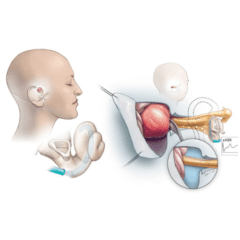Acoustic Neuroma Treatment in Jaipur
Acoustic Neuroma is a type of noncancerous brain tumor that grows on the nerve responsible for hearing and balance. It is also known as vestibular schwannoma. The tumor grows slowly over time and can cause hearing loss, ringing in the ears, dizziness, and balance problems. If you or someone you know is suffering from vestibular schwannoma, Dr. Arvind Jaga is an experienced and skilled physiotherapist who specializes in acoustic neuroma treatment in Jaipur. Dr. Jaga has extensive experience in treating acoustic neuroma and uses the latest surgical techniques to ensure the best possible outcome for his patients.
One of the most effective treatments for acoustic neuroma is surgery. Dr. Jaga uses a minimally invasive approach to remove the tumor, which reduces the risk of complications and allows for a faster recovery time. He also uses advanced imaging techniques such as MRI and CT scans to accurately diagnose and locate the tumor.
In addition to surgery, Dr. Jaga also offers other treatment options for acoustic neuroma, including radiation therapy and observation. He will work closely with each patient to determine the best treatment plan based on their individual needs and preferences.
Dr. Jaga is known for his compassionate and personalized approach to patient care. He takes the time to listen to his patients’ concerns and answer their questions, ensuring they feel comfortable and confident in their treatment plan.
If you or someone you know is suffering from acoustic neuroma, contact Dr. Arvind Jaga in Jaipur today to schedule a consultation. With his expertise and dedication to patient care, you can be confident you are receiving the best possible treatment for your condition
What is an acoustic neuroma?
An acoustic neuroma, also called a vestibular schwannoma, is a non-cancerous tumor that occurs around your balance and hearing nerves that connect your inner ear with your brain.
The term schwannoma means the tumor developed from Schwann cells. These cells surround nerves in the peripheral nervous system (nerves outside the brain and spinal cord) and normally insulate and support the function of nerves. Schwannomas can occur in nerves across the body, but in the head, these most commonly occur from the vestibular nerve, or balance nerve.
Are you wondering if Watch and Wait is the best approach for your acoustic neuroma? Also known as Wait & See or Observation, this approach involves monitoring the tumor’s progress with periodic/annual MRI scans. Since acoustic neuromas are usually benign and grow slowly or not at all, immediate treatment may not be necessary. However, if the tumor starts to grow, intervention may be necessary, and the best method of treatment will be determined between you and your doctor.
While Watch and Wait has been the standard treatment for small tumors and for those who develop acoustic neuromas in later life, there is an alternative line of thinking that early treatment may be better. This is because as the tumor grows, it can place increasing pressure on the facial and hearing nerves, leading to facial numbness and decreased hearing. Treating the tumor before these side effects occur may result in a better long-term outcome.
The decision to adopt Watch & Wait or seek immediate treatment will depend on many factors and must be discussed with your doctor. If you’re looking for an expert physiotherapist to help you make this decision, Dr. Arvind jaga acoustic neuroma clinic in Jaipur is here to help. Contact him today to schedule a consultation.
